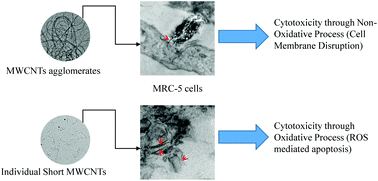Toxicity mechanism in fetal lung fibroblast cells for multi-walled carbon nanotubes defined by chemical impurities and dispersibility†
Abstract
Multi-walled carbon nanotubes (MWCNTs) are beneficial in a wide range of applications in fields such as electronics, optics and nano-medicine, so knowledge concerning their effect on human health is important. Physiochemical properties of MWCNTs can greatly affect their toxicity, however, there are no reports discussing the effect of size and chemical composition of MWCNTs on the toxic response of human lung cells. In this study, MWCNTs of two different purity grades were characterized and their toxic effects were compared on normal fetal lung fibroblast MRC-5 cells. The toxic effect on MRC-5 cells following 1–3 days exposure to low concentrations of research grade (RG) and industrial grade (IG) MWCNTs were studied using multiple biological assays. MWCNTs uptake in MRC-5 cells was analyzed using TEM. After physical and chemical analysis, RG-MWCNTs revealed contamination with MoS2 and were readily suspended in distilled water while IG-MWCNTs had no MoS2 contamination and much lower dispersibility. For a wide range of concentrations and exposure times, cells treated with RG-MWCNTs had distinctly reduced cell viability as compared to cells treated with IG-MWCNTs. Treatment with RG-MWCNTs resulted in high reactive oxygen/nitrogen species (ROS/RNS) levels indicating an oxidative stress mechanism while IG-MWCNT treated cells had low ROS/RNS amounts and a distorted cell membrane pointing towards a non-oxidative stress mechanism. Both agglomerates and individual MWCNTs were internalized efficiently by MRC-5 cells, which resulted in cell damage and ultimately cell death. Altogether, this study shows that the MoS2 contamination and size of MWCNTs’ agglomerates affect the mechanism of toxicity in human fetal lung fibroblasts.


 Please wait while we load your content...
Please wait while we load your content...